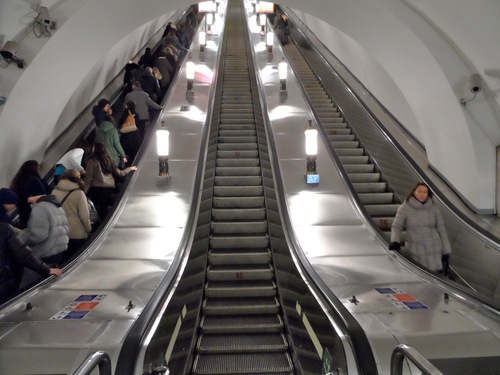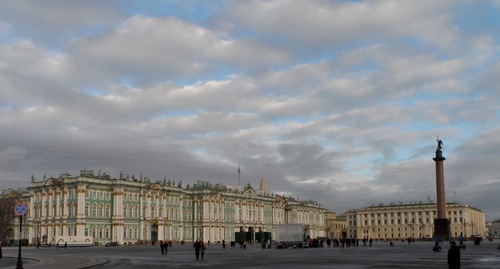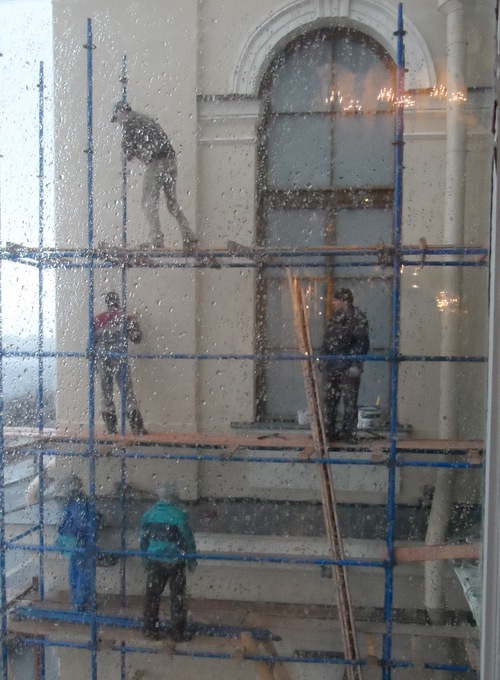
From November 21st to November 28th we’ll be posting writing from Ed Wolf documenting his trip to the Side-By-Side LGBT Film Festival in St. Petersburg. Catch up with Part One, Part Two, Part Three, Part Four.
Part Five: Paradox
Sunday November 23rd
It’s 9 am, and it’s still dark outside.
I’ve received a message from Bard who is staying here at the hotel. Bard is a member of this year’s festival jury as well as the programming director for a similar film festival in Oslo, Norway. He suggests we have breakfast together. I hop in the shower and get dressed, happy to have something other than my orange outfit to wear.
In the hotel restaurant, Bard tells me that the festival screening has been cancelled for today. The owner of the venue where the bomb scare occurred last night no longer wants to have the festival on their premises. Even though there’s a signed agreement to use the space, the owner refuses. It’s impossible to know if there are other pressures involved, besides the bomb scare—but whatever the truth is, the festival is cancelled for today.
We have a long leisurely breakfast and talk about film, the terrible situation for Russia’s queer community, HIV, and life in San Francisco vs. Oslo. We have the whole day ahead of us and decide to go to the Hermitage, Russia’s most famous museum.
As we leave the hotel, the clouds suddenly clear and there is sunlight and blue sky. We walk several blocks before heading down into the massive marble and granite station. We can’t believe the length of the escalator; it takes us several hundred feet underground. The murals, busts and mosaics in the station are worthy of a museum all by themselves. Within fifteen minutes we’ve traveled to the river and have returned aboveground, walking toward the Hermitage complex.
The weather is exhilarating and beautiful. It lifts some of the heaviness from the bomb scare and resulting cancelation. The majesty of the museum and square is fantastic and I become aware of how far I’ve been able to walk today without having to stop and give my new artificial knees a rest. All the surgery, hospital stays, pain management, physical therapy, and bodywork have paid off. Healing was slow in coming, but it has arrived.

We stand in a long line, waiting to enter the museum. Once we buy our tickets and check our coats, we head directly to the café for coffee and chocolate. I observe the endless array of people passing by and my gaydar begins to go off. As we began walking through room after luxurious room of paintings, furniture, tapestries and sculptures, it’s powerful and also sad to see the mothers and fathers walking hand in hand, the young men and women holding and embracing each other, but the gay men, some of whom are clearly together, sharing no public display of affection, no physical contact. I think of my partner Kirk and how easily and often we walk through the world holding hands. That simple basic act: to walk along holding hands, is a human right that is denied, or is at least unsafe, for many.
Room after magnificent room; I can’t believe what I’m seeing, each gallery more indescribable than the last. I look out a window and see that the sunshine has been replaced by rain. I watch five men erecting scaffolding several stories off the ground. The treasures within the museum have cast their spell. For the moment, everything looks beautiful, even raindrops sliding down a windowpane.
Bard and I sit in the Rembrandt gallery and take a rest. We’re getting tired. I start humming quietly to myself. Bard receives a text message saying that a new venue has been found and the festival will continue tomorrow. Some of the organizers are having dinner and we’re asked to join them. We decide to head back to the hotel.
When I get up, I become aware of how much I’ve walked today. My legs are stiff, knees a bit swollen. We leave the Rembrandts and come upon a vast stairway that leads down to the exit. There’s no handrail. For just a moment, I hesitate to ask Bard for help getting to the bottom of the steps. I’m aware of the insidious nature of the kind of oppression that exists here. Just the simple act of holding on to another man could be suspicious. I tell Bard I need to lean on his shoulder as we go down and he says, “Of course.”

We retrieve our coats and go out into the rain, heading for the subway. I comment on the beauty of what we’ve seen today and Bard says he’s reluctant to acknowledge anything beautiful about St. Petersburg, given the situation here for the LGBT community. I tell him I agree: it’s difficult to know how to hold it all.
I tell him about a meditation retreat that I once attended in California. There was a handwritten note hanging on the wall in the room where I stayed. It read: Paradox is the only basket large enough to carry truth. I tell him I’m struggling to find a way to hold the contradictory nature of both the beauty and the ignorant hatred that I’m experiencing here.
We leave the station and begin walking through the rain. It begins to hail. We find the restaurant and Manny and Gulya and Tanya arrive as well. A German director joins us and throughout dinner, the conversations focus on the festival, the effectiveness of bomb scares to disrupt, the coming Olympics, and how the oppression here is on the rise. I talk about the many people that I have encountered, both at home and on my journey here, who are aware of the homophobia and repression that is occurring in Russia. There’s a lot of awareness about the problem, but many don’t know what to do about it. There’s agreement that it’s good that the West is aware, but that large-scale change is not going to happen until more Russian people, LGBT and straight, become involved and organized themselves.
We finish our meal and stand outside the restaurant. The rain has stopped. We ask a passerby to take our picture. We say good-bye. Bard and I buy some bottled water before heading back to the hotel. Before we part in the elevator, I tell him how much I’ve enjoyed our day together.
I’m back in my room and it’s dark outside again. The beauty of the Hermitage, the bomb scares, the disruption of the festival, the persistence and resilience of Manny and Gulya to make sure the screenings continue. It’s a lot to consider and to hold.
I lay down, so grateful for Kirk and the freedom we have to walk down our streets hand-in-hand.




